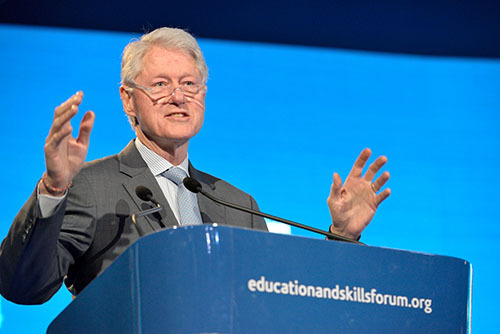
Two and a half years ago, inspired by a group of young international students concerned about the relevance of their 21st century education to today’s world, Elkezdtem A Global Search for Education.
I believe it takes a global community to bring about meaningful change. My goal was to question the conventional wisdom of traditional education systems. It was my hope that A Global Search for Education initiative would inspire education thought leaders to participate in global discourse to identify sustainable solutions for our common issues for the benefit of education systems worldwide.
Building the bridge between existing education systems and our 21st century world involved gathering the perspectives of over 100 global thought leaders from over 30 countries with backgrounds in education, business and government. To date in A Global Search for Education sorozat, we have published over 170 of these interviews (available on the Huffington Post and now also available on www.cmrubinworld.com.) In these Q and A’s lie the seeds of inspiration for creating a new and improved blueprint for the future of education.
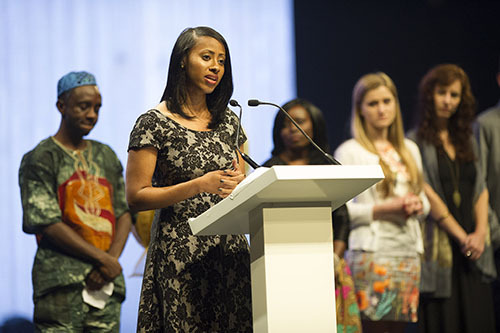
I believe we are now at a turning point where educators, politicians and the private sector have little choice but to ensure that a relevant, quality education is available for all. Just look at the timing. The profound technological changes disrupting our world have created strategic concerns for all parties. Studies have shown that the business sector faces hiring frustrations when trying to find young talent with the right skills to support their new commercial initiatives. The irony of these hiring frustrations is that there are young adults urgently looking for jobs who appear to be currently unemployable. Since governments continue to be judged on whether unemployment rises or falls, and chief executives need young adults with better skills, everything points to the need for both to invest in education. Educators too need to stay on top of their relevance. The value of an education will continue to be judged on its ability to ensure graduates can secure good jobs and foster a better quality of life. At the other end of the scale, 775 million adults globally still lack basic reading and writing skills; felett 122 million are young people. 57 million children in emerging markets are currently without any form of education. We know that education remains the most powerful tool for ending global poverty and ensuring long-term sustainable quality of life and economic progress. It affects all aspects of a modern society.
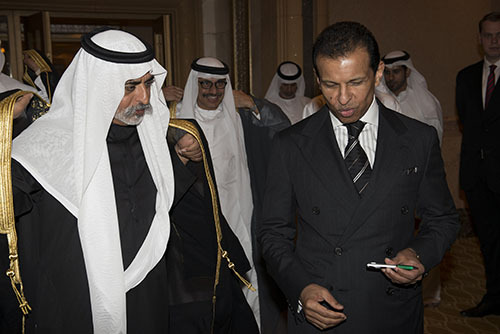
We are making progress. Under the patronage of Sheikh Mohammed bin Rashid, Prime Minister of the UAE and ruler of Dubai, felett 850 a világ vezetői, üzleti vezetők, kormány miniszterei, és oktatási szakértők, köztük Bill Clinton és Tony Blair, gyűjtött Dubai, Egyesült Arab Emírségek az elmúlt hétvégén a 2. éves Globális Oktatási és Szakképzési Fórum (GESF) to continue to raise awareness for these crucial issues. The Forum, jointly organized by UNESCO, The Commonwealth Business Council, The UAE Government and GEMS Education, explored ways to create scalable change to education systems at global and local levels, including effective ways to engage public and private partnerships. Továbbá, panelists discussed the opportunities and challenges of disruptive technologies, technical and vocational education, and equity in education. While it was inspiring to hear Bill Clinton and Tony Blair deliver thoughtful insights on how to improve education, the true celebrities of the three day event for me were the children who performed at the opening night gala, reminding us that each one of them has a dream. Ami még fontosabb, each one of us must play our part in helping them take their place in society with the right tools and opportunities to realize those dreams.
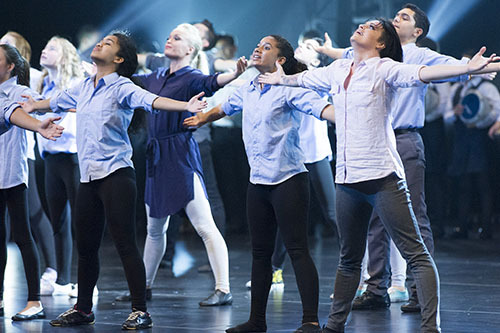
Global educational challenges need to be addressed in the context of country and/or region and additionally be respectful of cultural influences. Azonban, if one studies the leading education systems around the world, one can learn how they got there and additionally note the commonalities in how they approach learning. In the United States for example, we have finally begun to pay attention. After more than a decade of test-driven, high-stakes accountability, many educators and policymakers are looking to move toward a more thoughtful approach for the future. One recent reform shift is to Common Core State Standards (CCSS). This has paved the way for other improvements, including a focus on new assessments.
The Global Education and Skills 2014 Forum stimulated good debate and engagement by its participants on all the major issues. The end of a good forum is always the beginning of a new conversation. As I travelled back to the US, a number of questions came to mind:
1. What can we all do to raise the value of teachers in every classroom so that we create a teaching profession of the same stature as the leading education systems such as Singapore, Korea and Finland? Credit for this question goes to the Chairman of GEMS, Sunny Varkey, who discussed his hopes to raise the status of teachers by launching the Varkey GEMS Foundation Global Teacher Prize, and to Bill Clinton for his comments on the US study which found that having one good teacher for only one year can have a dramatic impact on a student for a lifetime.
2. What more can we do to ensure that both the academic pathway and the vocational pathway are treated with equal respect as they are in leading education systems? Why is an education in the US tied to industry considered second rate or the alternative for less fortunate students? This stigma does not exist in other leading education systems. Credit for this question goes to Andreas Schleicher’s comments on the successful Swedish system of higher vocational education, in which private training providers bid (alongside public training providers) for contracts to deliver post-secondary vocational training. The relatively open market is balanced by demanding quality assurance, and by the requirement that training providers partner with local employers to offer work-based learning as part of the program (this being a condition of receiving funding).
3. Is there a way to engage parents in these forums? Aren’t parents also partners in the education journey? Do we think we can bring about dramatic education reform without first, educating parents and second, ensuring they will sign on to new initiatives? Credit to this question goes to Tony Blair who inspired me to “think like a parent and not like a politician!”
4. Is it possible to create a global common core – one that establishes consistent education standards across the world and ensures that students graduating from secondary education are ready to enter academic or vocational pathways?
5. What can be done to put more focus on STEAM (STEM plus Art) in education systems? Tanulmány után tanulmány kimutatta, hogy a művészeti oktatás fejleszti a diákok’ a kreativitás és a problémamegoldó készség, attributes that are crucial for success in almost any field in a 21st century world. Let’s not forget the legacy of the great Steve Jobs.
6. What can be done to better address the emotional well-being of kids today given the rise in competition and the pressure to achieve?
7. What is the range of jobs that will be affected by the technology revolution? What can we learn from this and what actions are needed?
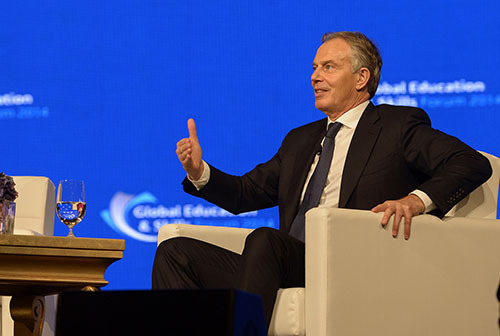
Photos are courtesy of Global Education and Skills Forum 2014 #GESF
After a presentation I made last year, a successful businessman discussed with me his frustrations in finding qualified young adults to hire for his growing global empire. “What are you looking for?” I asked. “karakter!” was his response. Beyond test scores and academic degrees, he placed significant importance on finding young adults with integrity, átélés, morals, alkalmazkodóképesség, curiosity and a passion to learn, lead and collaborate. Credit for this comment goes to my friends, Howard Gardner and Pasi Sahlberg – gentlemen, I think you are on to something.
As the organizers of the hugely successful Global Education and Skills Forum 2014 dismantle the panels and begin to think about the 2015 event, I hope some of these thoughts will inspire. There is so much work to do. Végtére, name one social, politikai, economic or environmental issue that the world faces today and I guarantee you can quickly find an education angle. What could be more important than getting it right?
A globális keresési Oktatási, velem és világszerte elismert szellemi vezetők többek között Sir Michael Barber (UK), DR. Michael blokk (Az US), DR. Leon Botstein (Az US), Professzor Clay Christensen (Az US), DR. Linda Darling-Hammond (Az US), DR. Madhav Chavan (India), Professzor Michael Fullan (Kanada), Professzor Howard Gardner (Az US), Professzor Andy Hargreaves (Az US), Professzor Yvonne Hellman (Hollandiában), Professzor Kristin Helstad (Norvégia), Jean Hendrickson (Az US), Professzor Rose Hipkins (Új-Zéland), Professzor Cornelia Hoogland (Kanada), Tisztelt Jeff Johnson (Kanada), Mrs. Chantal Kaufmann (Belgium), DR. Eija Kauppinen (Finnország), Államtitkár Tapio Kosunen (Finnország), Professzor Dominique Lafontaine (Belgium), Professor Hugh Lauder (UK), Professor Ben Levin (Kanada), Lord Ken Macdonald (UK), Professzor Barry McGaw (Ausztrália), Shiv Nadar (India), Professzor R. Natarajan (India), DR. PAK NG (Szingapúr), DR. Denise Pope (US), Sridhar Rajagopalan (India), DR. Diane Ravitch (Az US), Richard Wilson Riley (Az US), Sir Ken Robinson (UK), Professzor Pasi Sahlberg (Finnország), Professzor Manabu Sato (Japán), Andreas Schleicher (PISA, OECD), DR. Anthony Seldon (UK), DR. David Shaffer (Az US), DR. Kirsten Magával ragadó Are (Norvégia), Chancellor Stephen Spahn (Az US), Yves Theze (Lycee Francais-beli), Professor Charles Ungerleider (Kanada), Professzor Tony Wagner (Az US), Sir David Watson (UK), Professzor Dylan Wiliam (UK), DR. Mark Wormald (UK), Professzor Theo Wubbels (Hollandiában), Professzor Michael Young (UK), és professzor Minxuan Zhang (Kína) mivel azok feltárása a nagy kép oktatási kérdés, hogy minden nemzet ma szembesül. A Global Search Oktatási közösségi oldal
C. M. Rubin a szerző két legolvasottabb internetes sorozat, amely megkapta a 2011 Upton Sinclair díjat, “A Global Search for Education” és “Hogyan fogjuk olvasása?” Ő a szerzője a három bestseller könyv, Beleértve The Real Alice Csodaországban, és a kiadója CMRubinWorld.
Kövesse C. M. Rubin on Twitter: www.twitter.com/@cmrubinworld



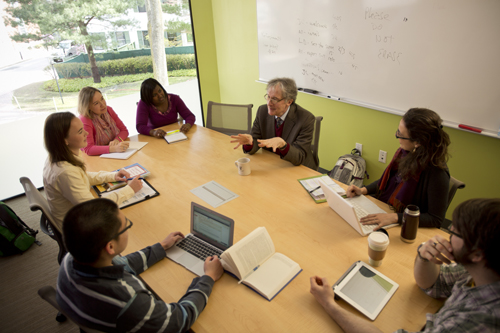
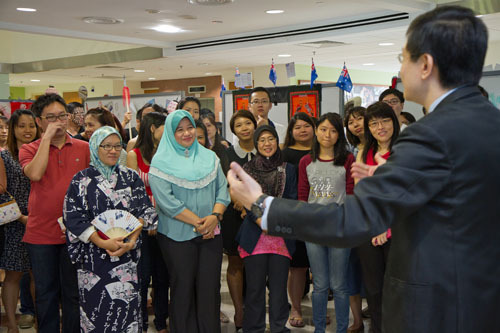

Legutóbbi hozzászólások